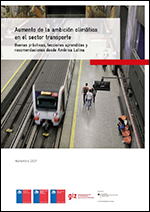Moving Chile
In order to achieve the goals of the Paris Climate Agreement, a global decarbonisation of the transport sector is necessary. Chile is therefore pursuing an ambitious e-mobility strategy. The project supported the Chilean government in implementing e-mobility in medium-sized and small cities. It developed a financing mechanism to promote e-mobility in taxis and buses with greater involvement of the private sector. The charging infrastructure was piloted with e-taxi and e-bus operators and capacities in this area are built. The project supported Chile both technically and organisationally in the exchange of experience of more ambitious mitigation measures in the region and in a communication campaign to promote the decarbonisation of transport.
- Countries
- Chile
- IKI funding
- 2,000,000.00 €
- Duration
- 08/2019 till 03/2024
- Status
- completed
- Implementing organisation
- Deutsche Gesellschaft für Internationale Zusammenarbeit (GIZ) GmbH
- Political Partner
-
- Ministry of Environment (MMA) - Chile
- Ministry of Transport and Telecommunications - Chile
- Implementing Partner
-
- Ministry of Environment (MMA) - Chile
- Ministry of Transport and Telecommunications - Chile
State of implementation/results
- Project completed.
- The +CargaRápida program was inaugurated with a public event led by the Minister of Transport and Telecommunications of Chile and national and local authorities. Through this program, 14 charging points have been installed in 10 cities outside of Santiago, allowing cabs and colectivos (cabs with a fixed route plan) to charge in 10 to 20 minutes (changing-transport.org/…).
- As part of a pilot project with the Agencia de Sostenibilidad Energética (ASE), Moving Chile promoted electric mobility in cities outside the capital Santiago. On the one hand, the establishment of a public charging infrastructure for cabs and colectivos was supported as part of the "Mi Taxi Electrico" program (mitaxielectrico.cl). On the other hand, the training of and knowledge exchange with bus operators from smaller and medium-sized cities was enabled.
- Training for bus operators: Ten half-day courses were held in ten cities across the country, attended by over 170 operators and 30 representatives from the Ministry of Transport and Telecommunications and Ministry of Energy. In addition, 28 operators visited Santiago as part of an electromobility tour to receive training and gain insight into the operation of electric transport terminals (changing-transport.org/…).
- The Ministry of Transport and Telecommunications participated in the Transport and Climate Change Week in Berlin from September 11 to 15, 2023, where they presented and shared experiences on the implementation of charging stations and the national sustainable mobility strategy.
- The project supported two study tours with delegations from Ecuador (BMZ project TUMIVolt) and Costa Rica (IKI project MiTransporte) in July and August 2022. Participants from technical and political levels exchanged views on national policies to promote electromobility.
- The project has developed a financing mechanism for the introduction of e-buses and e-taxis in medium-sized Chilean cities. The mechanism separates the ownership and operation of vehicles to diversify risk and improve financing conditions (changing-transport.org/…).
- The peer-to-peer technical exchange on raising climate ambition in transport in 2021 brought together representatives from transport, environment and energy ministries from nine Latin American countries to discuss strategies for sustainable mobility (changing-transport.org/…).
- At COP26, the Chilean Ministry of Transport and Telecommunications presented the publication "Aumento de la ambición climática en el sector transporte. Buenas prácticas, lecciones aprendidas y recomendaciones desde América Latina". The publication provides a detailed summary of the main issues, strategies and lessons learned from the peer-to-peer exchange (zero.changing-transport.org).
- Support for the publication of the "Play-book for Zero Emissions Mobility LAC" at COP26. It highlights practical steps and resources that leaders can refer to on their way towards decarbonising transport (changing-transport. org/publication/the-playbook-for-zero-emissions-mobility-lac/).
- Conduct of a course on electric mobility for Latin America with 45 representatives from five countries (changing-transport.org/…).
- During the Transport and Climate Change Week in June 2021, a tool developed by the project was presented to enable the economic and financial evaluation of e-bus fleets in English, Spanish and French (changing-transport.org/…).
Latest Update:
04/2024
Project relations
Legend:
The link has been copied to the clipboard





